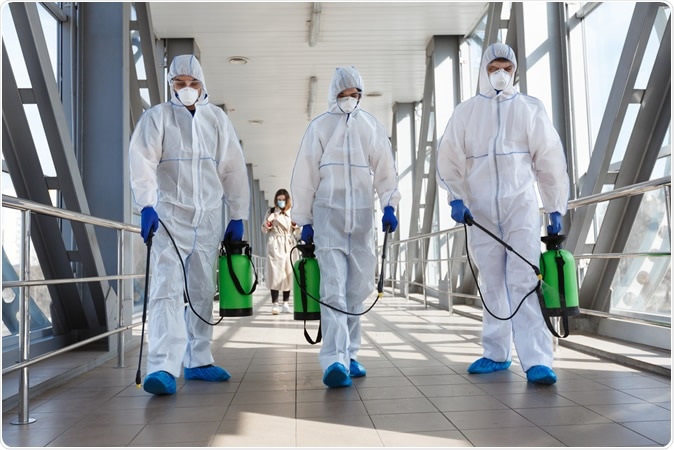Spraying disinfectants in outdoor spaces such as streets are not recommended to kill the novel coronavirus or other pathogens, the World Health Organization (WHO) warns.
The interim guidance released by the WHO aims to help health authorities formulate and implement policies on the disinfection of environmental surfaces during the coronavirus disease (COVID-19) pandemic.
Titled “Cleaning and disinfection of environmental surfaces in the context of COVID-19,” the guidance warns against spraying disinfectants since they are inactivated by dirt and debris. It is also not feasible to manually remove all organic matter from these surfaces.
Spraying not effective
The guidance also states that disinfecting sidewalks and unpaved walkways would be even less effective. Chemical spraying may not adequately cover all surfaces for the duration of the needed contact time to inactivate the virus. The health experts also emphasized that sidewalks and streets are not considered as reservoirs for the novel coronavirus, called the severe acute respiratory syndrome coronavirus 2 (SARS-CoV-2).
In addition, the WHO warns against spraying people with disinfectants, like in chambers or tunnels. This may not help in reducing the person’s ability to transmit the virus through droplets or close contact.
“This could be physically and psychologically harmful and would not reduce an infected person’s ability to spread the virus through droplets or contact,” the document reads.
Also, spraying disinfectants such as chlorine and other toxic chemicals, directly to individuals may be harmful. These may cause eye and skin irritation, gastrointestinal issues such as nausea and vomiting, and bronchospasm due to inhalation.

Image Credit: Prostock-studio / Shutterstock
Even in indoor spaces
The same goes for indoor spaces, such as hospitals and workplaces. The WHO does not recommend the routine application of disinfectants on environmental surfaces by spraying, fogging, misting or fumigation to kill the coronavirus.
In indoor spaces, including healthcare settings, spraying may not be effective in removing organic material and may miss surfaced covered with objects. Further, doing so may pose serious health risks, such as eye irritation, skin irritation, and respiratory issues.
In disinfecting surfaces, it is better to use a cloth or a wipe soaked in a disinfectant solution. Since the SARS-CoV-2 can attach itself to surfaces for many days, wiping the surfaces is more effective.
How to kill the coronavirus?
Like other coronaviruses, such as the severe acute respiratory syndrome coronavirus 1 (SARS-CoV-1) and the Middle East respiratory syndrome coronavirus (MERS-CoV), SARS-CoV-2 is an enveloped virus with a delicate outer lipid cover, making it more vulnerable to disinfectants compared to non-enveloped viruses such as the poliovirus, norovirus, and rotavirus.
Previous studies have shown that the COVID-19 virus can stay for days on certain surfaces. The virus remains viable up to one day on fabric and wood, up to two days on glass, four days on plastic and steel, and up to one week on the outer layer of the medical mask.
Disinfecting environmental surfaces in healthcare settings that serve as a virus reservoir is crucial to prevent the spread of the virus, which has now infected more than 4.79 million people and killed more than 318,000 worldwide.
Cleaning helps remove pathogens and reduce their load on contaminated surfaces. Usually, cleaning with water and soap, along with some form of mechanical action like scrubbing, remove the dirt, debris, and even secretions. However, it is not enough to kill microorganisms.
It is recommended to use chemical disinfectants, such as alcohol and chlorine. These should be applied after cleaning to kill all the remaining pathogens on the surfaces.
It is vital to prepare disinfectants based on the manufacturer’s recommendations.
“Follow the manufacturer’s instructions to ensure that disinfectants are prepared and handled safety, wearing the appropriate personal protective equipment (PPE) to avoid chemical exposure,” the WHO explained.
Chemicals should not be mixed to prevent generating fumes that can irritate the eyes and lungs. Also, inadequate dilations of concentrations may reduce their efficacy. On the other hand, high concentrations may cause damage to surfaces and health risks for those who will be exposed to the chemicals.
Also, disinfecting surfaces should focus on high-touch areas and objects, such as bed rails, door handles, light switches, tables, intravenous pumps, water dispenses, trays, and sinks, among others. However, all touchable surfaces should be disinfected.